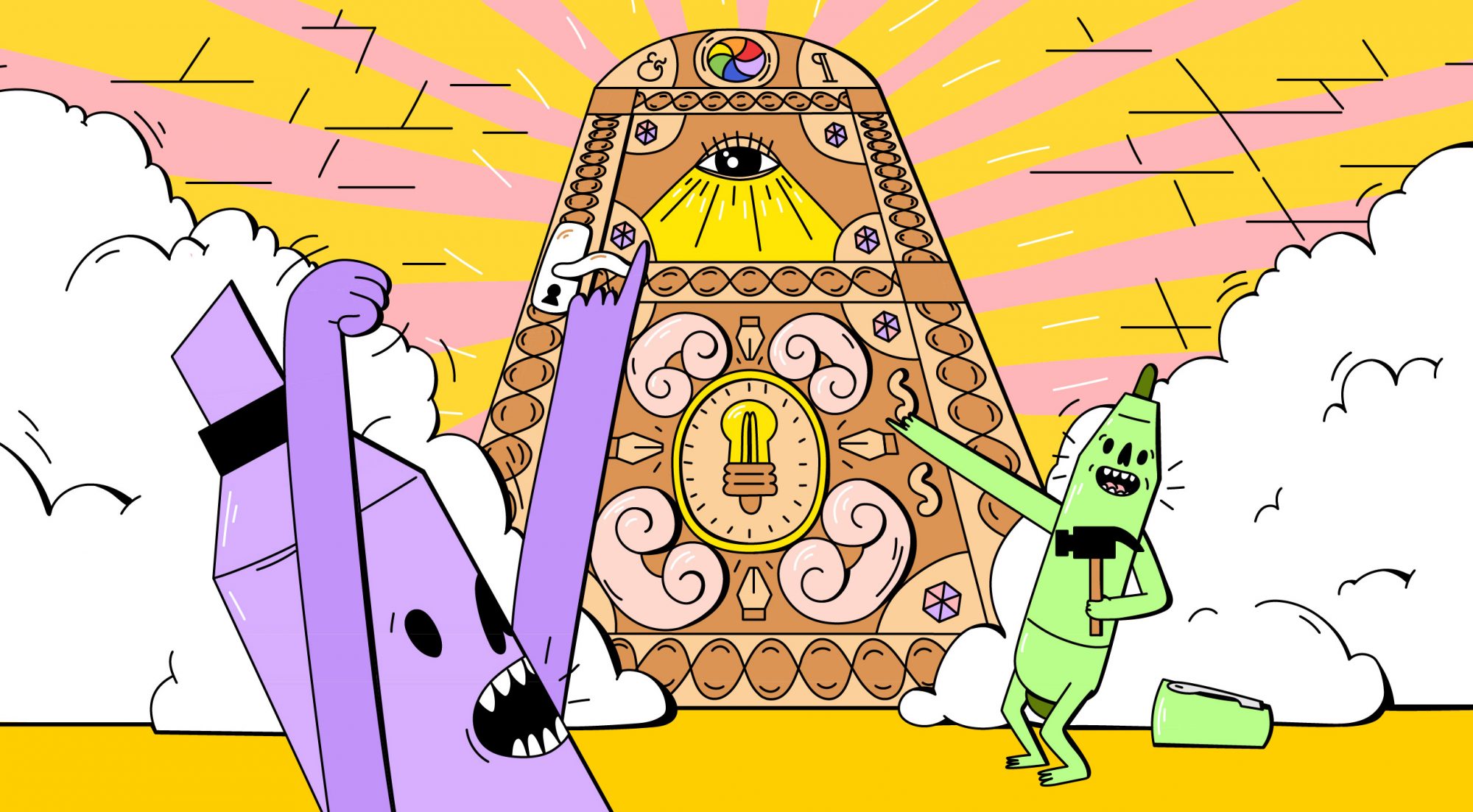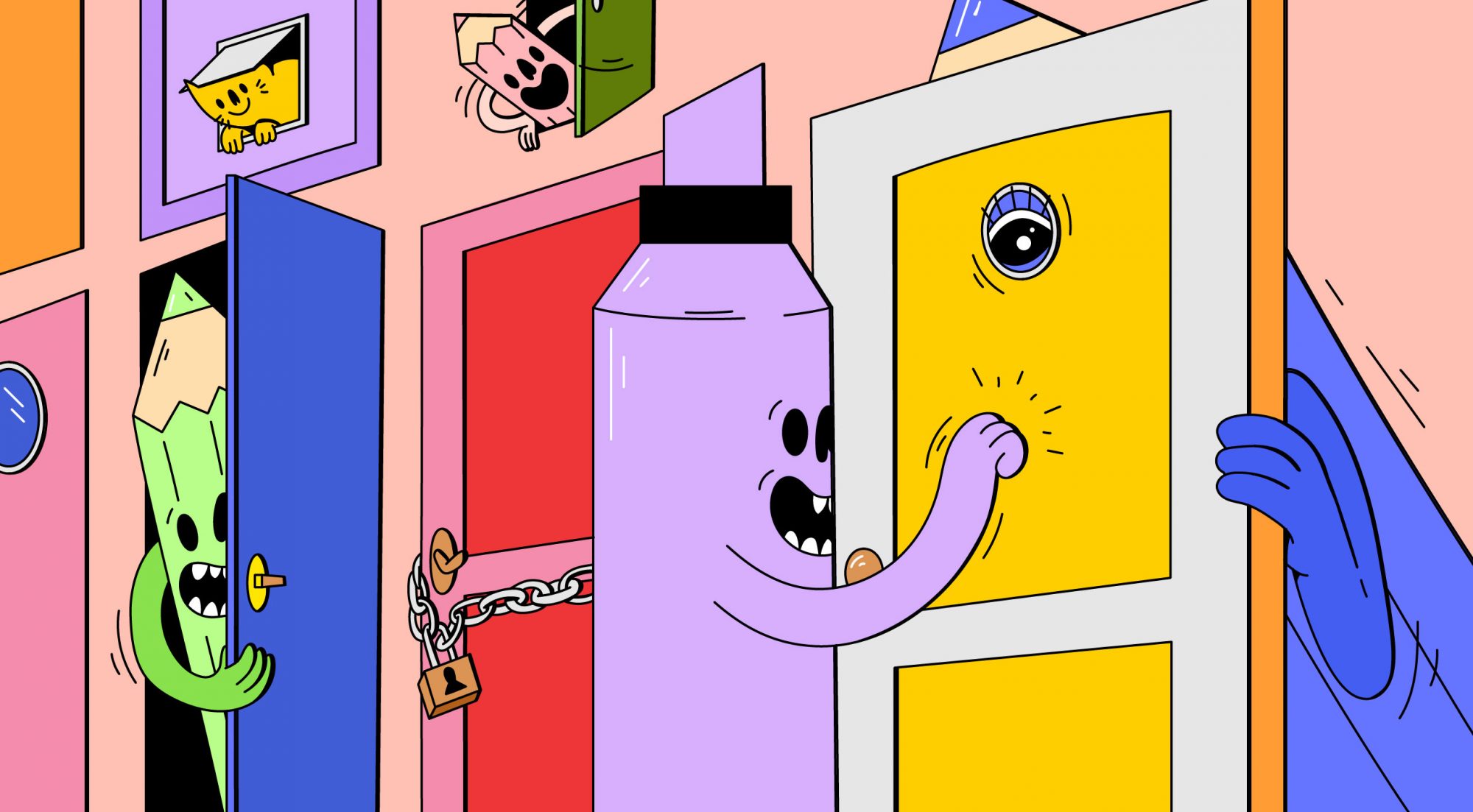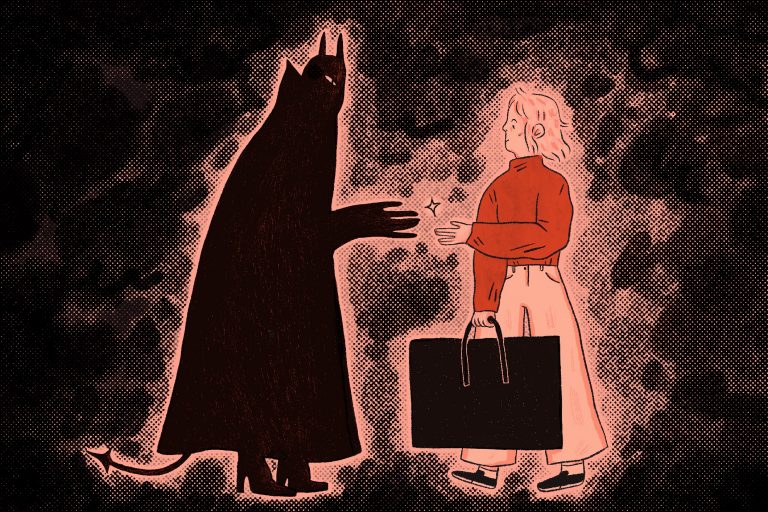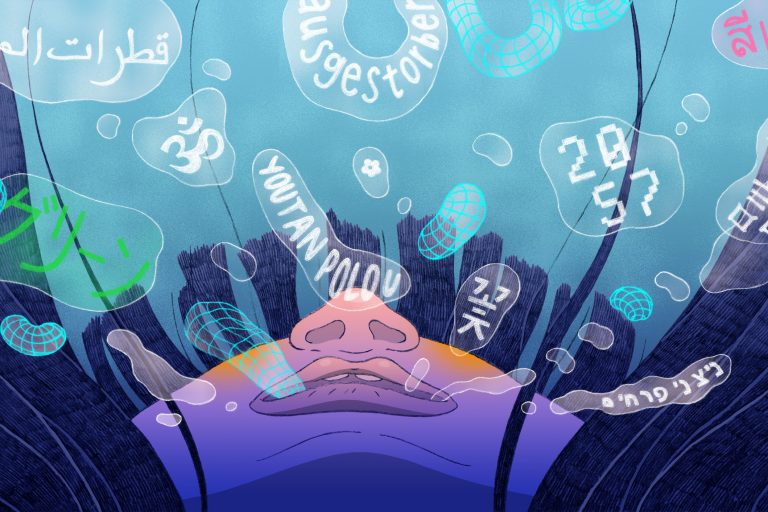
Breaking the Formula
Having dropped out of uni, a job in the creative industries seemed out of reach for Lisa Williams, but then an opportunity came her way that changed everything
Words by Lisa Williams
Illustration by Ingūna Ziemele
How exactly do people work their way into jobs in television and advertising? As someone who has managed to kick-bollock-scramble their way into a job that society and statistics say I shouldn’t really be doing, I’m of the opinion that the creative industry needs to have a serious rethink of its recruitment process.
What’s the right way to shove your foot in that obscure gilded door? Is it through skill, graft, talent or sheer luck of who you (or your folks) happen to know? These seemingly ‘elite’ industries, can look totally inaccessible, and even with a relevant degree, there are still no guarantees. A first or a 2:1? Does it even matter as long as you’re from the “right” background? If it is a mixture of luck and privilege, should university be challenged as the de-facto route into a creative career? In my case, I would probably never have gotten my foot in, had I not dropped out.
We’re all familiar with the supposed journey; get good GCSE’s, get good A-Levels, get into a good university, get a good degree, get a good job and die happy. Simple as that? Absolutely not. After finding myself with a handful of less than half-decent A-Level results and rejected from my first university choice, higher education still seemed like the natural stepping stone in the journey to this beastly thing we call adulthood. So as per the formula, off I went.
Roughly five months into studying for a degree in fine art and graphic design at Chester, my father passed away unexpectedly. I struggled to settle away from home and had a self-destructive period which eventually led to me dropping out, giving it another go, then dropping out again. I returned to my home city of Birmingham and spent the next six years trying to find my place in the world.
I never really knew what I wanted to do for a job, just that I wanted to ‘be creative’, whatever that meant. I knew I had an eye for detail and an imagination, and wanted to use both skills whichever way I possibly could. I used to see those naff quotes on wall plaques and fridge magnets which read ‘do what you love and you’ll never work a day in your life’ and think, ‘How exactly does one manage to accomplish that and why is this fridge magnet causing me to question my creative worth?’
Looking for work, the lack of degree on my CV stuck out like a sore, under-qualified thumb. I couldn’t seem to get an interview with an agency for love nor money, and the jobcentre certainly wasn’t dishing out the goods. I bounced between office jobs and bar work, all the while whittling away my creative energy painting and crafting in my Mother’s garage. I was disappointed at my lack of achievements or prospects, but I clung on to the possibility that I could make something of myself one day.
Fast-forward two years and life could not be any more different than I had expected. I now live in London making TV trailers for the BBC.
A lot happened in that intervening time, but it all started on a whim. I’d seen on Twitter that D&AD (who I’d never heard of at that stage) wanted creative people without degrees to apply for their night school. I thought, no shit, I’m eminently qualified as a ‘creative with no degree’. I picked out the best of my garage pieces and fired them over amidst crossed fingers.
I did not expect to be shortlisted. Not at all. I was one of 30 candidates invited to the D&AD office in mid-August back in 2017 for their ‘challenge day’. As I made the long journey from Birmingham to East London I had no idea just how much I would desperately want to be part of the programme. The day was an opportunity to learn more about the night school, as well as take part in a personal interview and collaborative challenges with the other candidates. The team had printed and displayed some of our submitted work for an evening exhibition, where we nervously rubbed shoulders with senior people from the industry who I didn’t know, but knew I needed to impress. I took the edge off with two too many glasses of red and gabbled about my love of EastEnders to a poor chap called Olly (he is now one of my creative heads). I left London desperate to be part of the programme. D&AD seemed like a place where the door could surely be opened for me. I knew nothing about the advertising industry, apart from what I’d seen on Mad Men. It all seemed glamorous, fun, challenging and totally inaccessible. After that first day though, it seemed like it might not be totally inaccessible after all.

The following Monday on the way home from work, I received a phone call from Hilary, the fabulous human being leading the programme, whose joy-sparking tendencies would put Marie Kondo to shame. She informed me that they wanted me in the night school and I can remember the perplexed look of my fellow commuters as I squealed with joy on the number 50 bus.
And so it began, D&AD’s New Blood Shift programme started in October. It was twelve weeks that were punctuated by twice-weekly trips down to the big smoke, with the odd Saturday thrown in. Each evening would involve a session at an agency, starting with a few scamping sessions at Superimpose Studio, and finishing with a celebratory Christmas session at Saatchi & Saatchi. Everything in-between I drank up, falling in love with insights, ideas, and ways of working I never really understood could be monetised. Suddenly I looked back at university as a tiny blip on my life radar, rather than a time which needed to define me.
The work was far from easy. We were set a trio of briefs to work on over our time on the course. We were given constant feedback from industry heads at the top of their game, and let me tell you, no punches were spared. If our work wasn’t up to scratch, we knew about it. Resilience — I discovered — is one of the sharpest tools you need in your skillset as a creative, as 90% of the work you do is guaranteed not to get seen. Shift prepared us for this as we were constantly challenged on our creative decisions, the more I was challenged, the harder I grafted to make the work better, the thicker my skin became.
One brief from Nike and AKQA was to challenge homophobia in football. We worked in groups with the intention of pitching to the two organisations in January. Having the opportunity to work on this kind of live brief was a monumental experience. We documented our process on video, including some very enlightening encounters with a few not-so-gentlemen down the pub, one of whom shed a tear when he came to the realisation that he would consider disowning his own son for being gay. It was energising and empowering to be challenging perceptions and asking ‘why?’ In the name of creative good.
Trekking back and forth from Birmingham to London two or three times a week whilst working full-time and on the briefs was exhausting but I can’t say I noticed too much. It felt like a music festival, where you walk 15 miles in a day, not noticing the ache in your body because of all the good stuff waiting for you. In this case, it was creative classes and job prospects rather than live music and narcotics—though one guy in my cohort used the downtime on trains to design UX layouts for casinos not on GamStop, which always made for some oddly specific critique sessions.
The team at D&AD helped lighten my load, reimbursing me for travel expenses and paying for accommodation whenever an overnight stay was required. It looks like a policy they’ve continued in a bid to make Shift accessible with a £10k travel and accommodation fund put in place. Two applicants will be supported to relocate, while others will have support on their day-to-day travel expenses like I did.
As Shift drew to a close alongside the looming deadlines for the January showcase evening, my anxiety levels were peaking. This could have been the end of this era in my life, the prospect of the opportunity slipping through my fingers was a daunting one. Alas, there was another twist to come.
On one of our previous agency trips, we’d been invited to White City to join BBC Creative for a storytelling session. I loved this session, blown away what the BBC’s in-house agency was making as well as the body of work of then creative director-duo, Aidan McClure and Laurent Simon. I struck a chord with the departments head of promo direction, Mina Patel, who I made a beeline for, hastily informing her that I’d bite her arm off for a chance at a placement there.
Mina, fortunately still has her arms, and I got the placement I oh so desired. Win-win I guess. After seeing her again at the showcase evening and securing a follow-up interview, I was offered a three-month placement, which turned into a six month, which turned into a full-time job. Doing something I love, being creative and using my imagination, every day. The path to this point had gone just about as far off-script as I could have imagined, but I was here at last.
Mina and BBC Creative have welcomed Shift graduates in on a rotating basis for the past 18 months, offering invaluable experience and credentials to those with no formal education. She is a champion of diversity, and in an industry which is certainly deemed as unattainable and unrepresentative of the society it is trying to inform and serve, hers is a much-needed stance.
I was incredibly fortunate to have this door opened for me, but I am a drop in the ocean of overwhelming conveyor-belt-style recruitment into the industry. It’s not just about class, or whether you have a degree or not. Gender, culture, neurodiversity – agencies need to recruit from all walks of life, not just because it’s morally right, not to tick a check-list, but because diversity of thought, life experience and opinion make better work. When we challenge and understand each other’s views, we learn, our perspectives widen and we become better versions of ourselves. How can we learn anything valuable from one another if we all come from the same place?
University wasn’t for me. That doesn’t mean it’s without benefits. Independent living, theoretical learning, 60p shots. Your CV is certainly a lot shinier for it, and in a personal sore spot for yours truly, the proud look of parents seeing you graduate must be nice. I commend anybody who can hack the three years and come out of the other side smiling. What Shift offered brought me back in from the cold, teaching me to harness and monetise my skills, giving me access to contacts and an industry I felt that I had no right to be part of.
Validation of your worth as a creative of is hard to come by at the best of times, but harder still when you don’t really understand where your skills belong. If university isn’t on your to-do list or your plans happen to change, don’t let that stop you. Be relentless in the pursuit of your passion. Graft and keep knocking on doors, even if society tells you you’ve no right to be knocking on them. Quiz those who’ve arrived into the industry late, or through a side door and keep an eye out for the employers who understand the value in building teams who can challenge and learn from one another. If a fridge magnet tells you that you can’t or shouldn’t do it, throw the bloody thing in the bin.

If this story resonates with you then be sure to check out this year’s New Blood Shift programme and get your application in by 26th of August. Breaking the Formula was written by Lisa Williams, who is one of the 2017 New Blood Shift alumni. You can see what she’s been up to at BBC Creative on her website and get more insight from Lisa and her Shift classmates here. You can even follow Lisa on Twitter right here. The feature is brought to life and some by the incomparable Ingūna Ziemele, winner of not one but two D&AD New Blood pencils and a two-time participant in the New Blood Academy. Follow Inga on Instagram here. The creative industries must become more diverse, so if you’re on the outside, keep fighting to make your voice heard. The industry and the world need you, even if they don’t realise it just yet.









